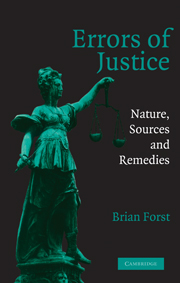Book contents
- Frontmatter
- Contents
- Preface
- Acknowledgments
- 1 The Problem
- 2 Errors of Due Process
- 3 Errors of Impunity
- 4 Frameworks for Analyzing the Incidence of Justice Errors
- 5 Assessing the Cost of Justice Errors
- 6 Standards of Evidence
- 7 Police-Induced Errors
- 8 Prosecution Policy and Justice Errors
- 9 The Jury
- 10 Sentencing and Corrections
- 11 Homicide
- 12 A Matter of Legitimacy
- Bibliography
- Index
- Titles in the series
5 - Assessing the Cost of Justice Errors
Published online by Cambridge University Press: 05 July 2011
- Frontmatter
- Contents
- Preface
- Acknowledgments
- 1 The Problem
- 2 Errors of Due Process
- 3 Errors of Impunity
- 4 Frameworks for Analyzing the Incidence of Justice Errors
- 5 Assessing the Cost of Justice Errors
- 6 Standards of Evidence
- 7 Police-Induced Errors
- 8 Prosecution Policy and Justice Errors
- 9 The Jury
- 10 Sentencing and Corrections
- 11 Homicide
- 12 A Matter of Legitimacy
- Bibliography
- Index
- Titles in the series
Summary
It is better that ten guilty persons escape than one innocent person suffer.
— Blackstone (1765, Book IV, Chapter 27)Introduction
It is often said that it is better to free several true offenders than to convict an innocent person, with “several” typically taking on numbers like 2, or Blackstone's famous “10,” or 99. But what are the justifications for such numbers? Should the ratio be the same for people charged with shoplifting and those charged with serial rape or child molestation? If not, why not? Do the ratios apply equally to cases that come to trial, cases filed in court, and to larger pools of suspects? Blackstone's dictum places an arbitrary lower bound on the tradeoff, leaving open the question, “How much better?,” thus side-stepping an assessment of the respective social costs of each type of error. It can be safely said only that civil libertarians tend to prefer large numbers, while law-and-order conservatives tend to prefer smaller ones.
Such preferences are based largely on opposing ethical positions. The civil libertarian places a higher premium on the need to protect the innocent, and the offender as well, against wrongful intrusions by police and prosecutors. The law-and-order conservative generally places a high premium on the need to protect citizens against offenders. These positions are often justified by the selective use of data: civil libertarians and progressives are more inclined to express concern over wrongful convictions and conservatives more inclined to express concern over “super-predators” who commit a disproportionate number of crimes and are then allowed to commit further crimes by a system that releases them from custody too soon.
- Type
- Chapter
- Information
- Errors of JusticeNature, Sources and Remedies, pp. 45 - 56Publisher: Cambridge University PressPrint publication year: 2003
- 1
- Cited by

